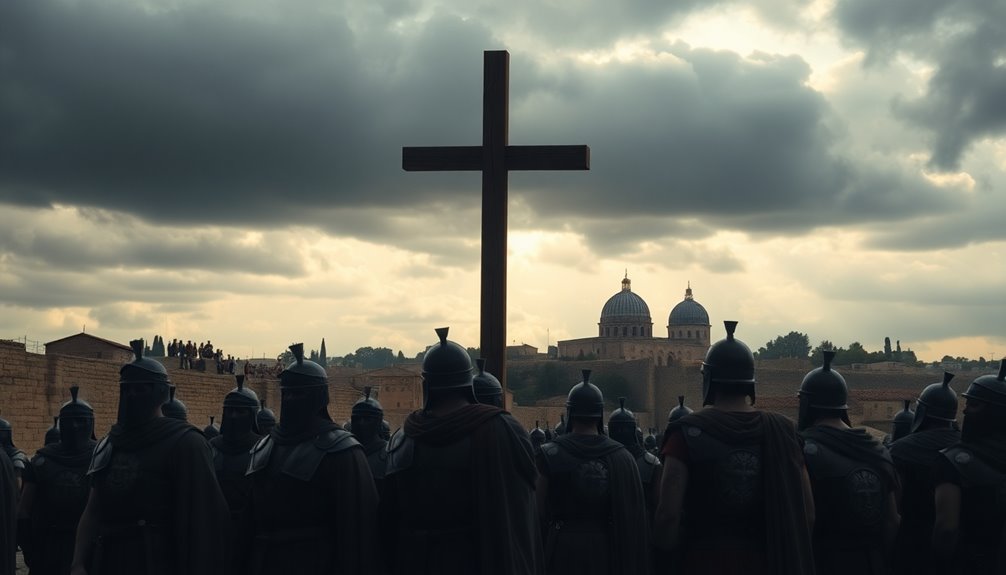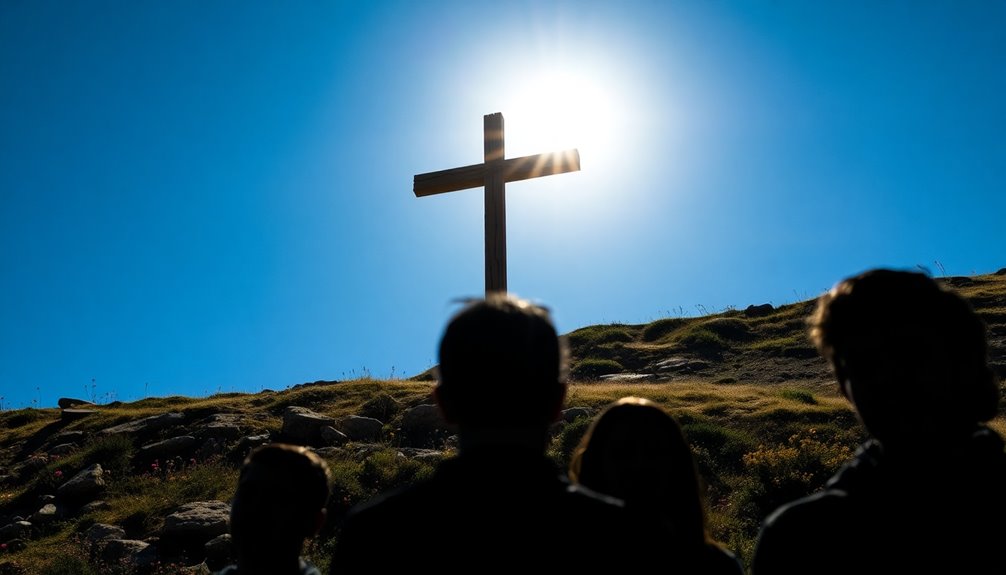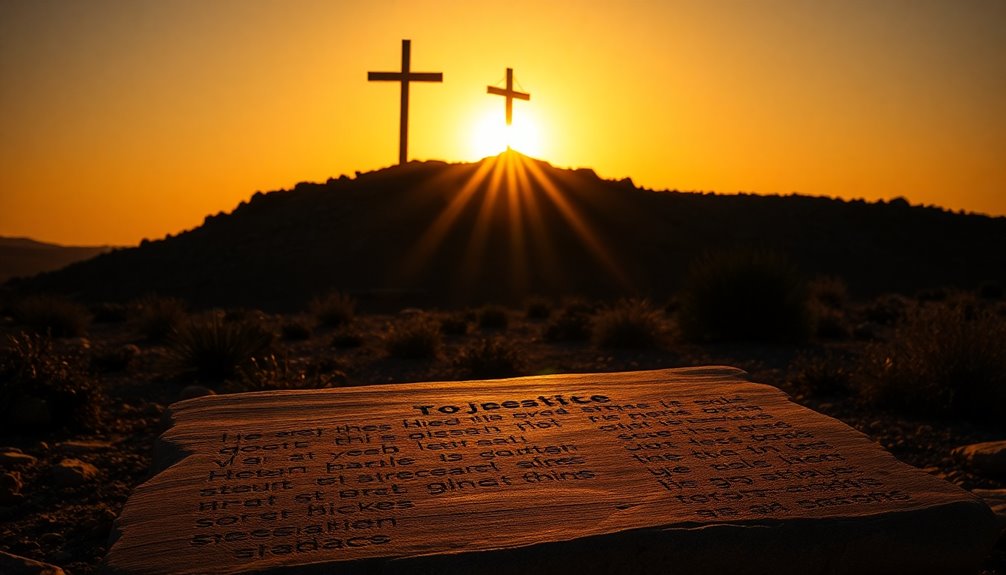Jesus was crucified due to a mix of political pressure and religious tensions. His revolutionary claims of divinity challenged the established order, leading Jewish leaders to accuse Him of blasphemy. The Roman authorities, particularly Pontius Pilate, faced public outcry and wanted to maintain control. They viewed Jesus as a potential instigator of rebellion against Rome, prompting His execution. This event, often misinterpreted, was a part of God's divine plan, fulfilling prophecies of atonement. If you explore further, you'll uncover deeper insights into the significance of this pivotal moment in history.
Key Takeaways
- Jesus was accused of blasphemy for claiming to be the Son of God, leading Jewish leaders to demand his execution.
- Roman authorities, particularly Pontius Pilate, sought to maintain political stability and appease the public outcry against Jesus.
- Jesus' teachings and claims challenged the existing religious order, creating fears of rebellion among both Jewish leaders and Roman authorities.
- Crucifixion served as a public deterrent against dissent, reinforcing Roman power and control during a volatile period.
- The event fulfilled Old Testament prophecies about the suffering servant, underscoring its significance in God's divine plan for redemption.
Introduction

In the context of ancient Judaea, Jesus' crucifixion stands as a pivotal moment that shaped the course of history. You can trace the roots of this event to the claims Jesus made about His identity as the Son of God. These assertions sparked accusations of blasphemy from Jewish leaders, who felt threatened by the shift in influence over the people. Their envy fueled a conspiracy that ultimately led to His arrest and trial.
Roman authorities, under the pressure of public outcry and the Jewish leaders, found themselves in a precarious position. To maintain order and avoid political backlash, Pontius Pilate authorized Jesus' execution. Thus, Jesus was crucified around AD 30 or AD 33, an event backed by various historical accounts.
However, Jesus' death wasn't just a tragic outcome of human actions; it was also a fulfillment of God's divine plan for salvation. As the ultimate sacrifice of atonement, His crucifixion was intended to reconcile humanity with God, paving the way for redemption.
This profound act of love and sacrifice resonates through history, reminding you of the significance of Jesus' mission.
Biblical Verses on Crucifixion

When you look at the biblical verses on crucifixion, you'll find powerful references that highlight its significance.
Primary verses, like Isaiah 53:5 and John 19:30, reveal the prophetic and redemptive nature of Jesus' sacrifice.
Secondary references, such as Hebrews 9:22 and Galatians 3:13, further illustrate how His death fulfilled divine justice and mercy.
Primary Bible References
The crucifixion of Jesus is deeply rooted in biblical prophecy and significance, with several key verses illuminating its importance. Luke 22:66-71 reveals that Jesus was crucified under the charge of blasphemy for claiming to be the Son of God. This event was prophesied in the Old Testament, particularly in Isaiah 53:5, which speaks of the suffering servant who bears the sins of many.
Matthew 27:37 highlights the charge against Him, stating, "This is Jesus, the King of the Jews," posted above His head on the cross.
Mark 15:34 captures Jesus' anguish as He cries out, "My God, my God, why have you forsaken me?" This fulfillment of Psalm 22:1 emphasizes His deep suffering during the crucifixion.
The theological significance of this act is further underscored in Hebrews 9:22, which reminds us that without the shedding of blood, there's no forgiveness of sins. Through His crucifixion, Jesus not only addressed the sins of humanity but also paved the way for righteousness at the present and the resurrection of Jesus Christ, offering hope and salvation to all who believe.
Secondary Bible References
How does the crucifixion of Jesus resonate throughout the New Testament? You see, the event is woven into the fabric of Scripture, emphasizing Christ's role as the ultimate sacrifice for humanity's sins.
In Matthew 27:38, Jesus hangs crucified between two thieves, highlighting His identification with sinners and the public nature of His execution.
John 19:30 captures His final declaration, "It is finished," signifying the completion of His mission to offer redemption through His death. This idea echoes the prophecy in Isaiah 53:5, where it's foretold that the Messiah would be wounded for our transgressions, underscoring the significance of His sacrifice.
Furthermore, Hebrews 9:22 states that without the shedding of blood, there's no forgiveness, reinforcing the necessity of Jesus' sacrificial death for atonement.
Galatians 3:13 ties it all together, revealing that Christ's crucifixion redeems us from the curse of the law, positioning Him as the ultimate sacrifice for our sins.
These verses illuminate the profound theological implications of the crucifixion, urging you to reflect on the depth of Christ's love and the weight of His sacrifice.
Roman Political Climate

In 1st century CE Judaea, a volatile political climate surrounded the interactions between Roman authorities and Jewish leadership. As the Roman governor, Pontius Pilate faced immense pressure from Jewish leaders who feared that Jesus' growing influence could spark unrest. They accused Jesus of blasphemy, claiming he was challenging both their authority and that of Rome. This accusation was serious; it framed Jesus as a potential instigator of rebellion, something Pilate couldn't ignore.
Pilate's primary concern was political stability. He knew that if he disregarded the demands of the Jewish leaders and the crowd, it might lead to riots or a loss of control over the province. Thus, he found himself in a precarious position, balancing his duty to maintain order with his own judgment that Jesus had committed no crime deserving of death.
Ultimately, Pilate opted for crucifixion, seeing it as a means to appease the crowd and demonstrate Roman authority. By executing Jesus, he aimed to deter any further dissent and uphold the imperial order. This decision reveals how deeply intertwined politics and religion were during this tumultuous period.
Cultural Context of Crucifixion

Crucifixion served as a brutal reminder of Rome's power and a stark warning to anyone who dared to challenge its authority. This method of execution was common, particularly for slaves, revolutionaries, and the most serious criminals. The Roman government used public executions to instill fear and maintain order, showcasing the consequences of dissent.
In this context, the relationship between Jewish religious authorities and the Roman government was complex. The authorities viewed Jesus as a significant threat to their power, while the Romans were primarily concerned with quelling any potential unrest.
Jesus' crucifixion occurred during Passover, a time marked by heightened tensions and large public gatherings. This politically charged atmosphere amplified the stakes, making public executions even more impactful. The charges against Jesus were displayed prominently to maximize their deterrent effect, serving as a warning to others who might challenge the status quo.
Crucifixion wasn't just about execution; it was meant to humiliate and disgrace the condemned, reflecting broader societal values that equated shame with punishment. In this way, Jesus' death wasn't only a political decision but also a cultural statement about authority and control.
Misunderstandings About Jesus' Intentions

You might think Jesus was crucified simply for being kind and inclusive, but that misses a crucial point.
His claims of divinity and authority directly challenged the religious leaders of His time, leading to serious accusations of blasphemy.
Understanding these misunderstandings about His mission is key to grasping the significance of His sacrifice.
Debunk Misconceptions About Sacrifice
While many view Jesus' crucifixion as a mere act of kindness or inclusivity, it's essential to understand that his intentions were far more complex. Jesus wasn't just a victim of circumstance; his claims of divinity and authority directly threatened the established religious order. The Jewish leaders saw Jesus' self-identification as the Son of God as blasphemy, leading to his trial and eventual crucifixion.
Misconceptions about Jesus' mission often led people to expect a conquering Messiah, not a suffering servant. This disillusionment among his followers clouded their understanding of his true purpose. Cultural values heavily influenced how society perceived Jesus' actions, distorting the theological significance of his sacrificial death.
Jesus' crucifixion wasn't simply about kindness; it was a deliberate act within a divine plan for redemption. His sacrifice was necessary for atonement and reconciliation with God, fulfilling prophecies and establishing a new covenant.
Misinterpretation of Jesus' Mission
Misunderstanding Jesus' mission has led many to view his actions through a distorted lens, focusing primarily on his kindness and inclusivity. This misinterpretation often omits his divine claims and the serious implications they'd for religious authorities. When Jesus associated with sinners, many perceived it as a direct challenge to Jewish law, resulting in accusations of blasphemy. These misunderstandings clouded his true intentions.
Many expected a conquering Messiah, overlooking Jesus' role as a suffering servant. This expectation turned his crucifixion into a perceived failure, rather than recognizing it as the fulfillment of prophecy. The spiritual significance of his death—serving as atonement for humanity's sins—often got overshadowed by the political dynamics of his execution.
If you focus solely on Jesus' compassion, you might miss the depth of his mission. He offered spiritual redemption and called for repentance, emphasizing a transformation of the heart over earthly peace and prosperity.
Faith in Daily Decisions

Every choice you make can reflect your faith, shaping how you interact with the world around you.
By engaging in group service projects, you not only live out your beliefs but also strengthen your community.
Consider how each decision can embody the love and sacrifice that Jesus demonstrated. Understanding the importance of community engagement can further enhance your commitment to service.
Daily Choices Reflect Faith
The choices you make every day reflect your faith and commitment to living out Jesus' teachings. Each decision, whether in personal interactions or ethical dilemmas, offers a chance to embody love, forgiveness, and integrity—core values of your beliefs.
When faced with tough choices, consider how Jesus would respond. Engaging in prayer and scripture reading can guide you, helping align your decisions with God's will and purpose.
Reflecting on Jesus' sacrifice encourages you to prioritize compassion and selflessness in your actions. By consciously choosing to act with love and forgiveness, you not only deepen your faith but also influence how others perceive your beliefs.
Your daily choices serve as a testament to your commitment, shaping how faith is experienced in your community. Implementing these faith-based principles in everyday decisions reinforces that living out your beliefs isn't passive; it's an active process.
It shapes your character and serves as a witness to others. Remember, every choice you make is an opportunity to reflect your faith and to honor Jesus' teachings, creating a ripple effect in the lives of those around you.
Group Service Projects Together
How can group service projects enhance your faith journey? Engaging in service projects together with your faith community allows you to embody Jesus' teachings of love and selflessness.
When you collaborate on initiatives that serve others, you not only apply your beliefs in practical ways but also demonstrate God's love through tangible acts. This shared mission fosters a sense of unity and strengthens relationships within your community, encouraging mutual support and accountability.
Participating in these projects can also inspire personal growth. As you reflect on your experiences, you may find new ways to integrate your faith into daily decisions.
Addressing local needs through group efforts aligns with the biblical call to care for the marginalized, reinforcing the idea that faith isn't just a personal journey but a collective responsibility.
Final Thoughts on Crucifixion

Crucifixion stands as a pivotal moment in Christian history, encapsulating profound theological truths. When Jesus was crucified, He became the ultimate sacrifice for humanity, fulfilling the Old Testament prophecies about atonement for sins committed. Unlike the blood of bulls once used in sacrifices, His blood offered a complete and final redemption and reconciliation between God and humanity.
The crucifixion wasn't just a tragic event; it was a necessary act in God's divine plan. Jesus' claims of divinity threatened the authority of Jewish leaders, who felt their power challenged. They conspired against Him, leading to His execution under Roman authority, which sought to maintain political stability. This act wasn't merely an end but a transformative beginning for believers.
The tearing of the temple veil upon Jesus' death symbolized the removal of barriers between you and God, emphasizing that through His sacrifice, you can experience a personal relationship with the Divine.
Reflecting on the significance of the crucifixion, you'll find a call to embrace the profound gift of grace and forgiveness that Jesus offers, forever altering the landscape of faith and salvation.
Additional Resources

As you reflect on the profound significance of Jesus' crucifixion, exploring additional resources can deepen your understanding and enhance your spiritual journey.
Lent, beginning with Ash Wednesday, is a time to contemplate Jesus' sacrifice and prepare for Easter. You might find daily devotionals helpful during this season, guiding you through themes of repentance and reflection on the New Testament narratives.
On Palm Sunday, consider resources that discuss Jesus' triumphant entry into Jerusalem, setting the stage for his crucifixion.
Maundy Thursday resources can offer insights into the Last Supper, where Jesus instituted communion and showcased humility through foot washing.
Good Friday is particularly poignant, as it commemorates Jesus' crucifixion. Look for materials that emphasize this event's significance as the ultimate sacrifice for humanity's sins.
Many churches and online platforms provide free eBooks and study guides that encourage deep reflection on the death and resurrection of Christ.
Frequently Asked Questions
What Was the Main Reason Jesus Was Crucified?
The main reason you see Jesus crucified stems from his claims of divine authority. He challenged the established religious norms, which made the leaders uneasy.
Their fear of losing power and influence led them to conspire against him. They pressured the Roman governor, Pontius Pilate, who ultimately authorized the crucifixion.
This political and religious tension culminated in a decision that changed history, marking a pivotal moment in the narrative of faith.
What Was the Legal Reason Jesus Was Crucified?
The legal reason Jesus was crucified centers on blasphemy and claims of kingship.
You see, the Jewish high priest accused him of declaring himself the Son of God, which violated their laws. This accusation roused fears among the Jewish leaders about losing their authority.
They pressured Pontius Pilate, the Roman governor, to authorize the crucifixion, framing it as a necessary action to maintain order and prevent potential unrest among the populace.
Why Did God Send Jesus to Be Crucified?
God sent Jesus to be crucified to fulfill His divine plan for humanity's salvation.
You'll see that this act symbolizes God's immense love, as Jesus willingly accepted His fate for the sake of the ungodly.
Through this sacrifice, He became the ultimate atonement for sin, providing a way for you and everyone else to find forgiveness and reconciliation with God.
It's a powerful testament to His commitment to humanity's redemption.
What Was the Purpose of the Death of Jesus?
The purpose of Jesus' death is rooted in God's plan for humanity's salvation.
You'll see that through His sacrifice, Jesus took on the weight of your sins, offering reconciliation and forgiveness.
This act demonstrates God's immense love and serves as a final atonement, allowing you to stand justified before Him.
Ultimately, His death conquers death itself, assuring you of eternal life if you believe and accept this gift.










